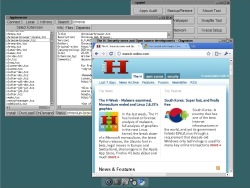Tiny Core Linux 3.0 RC1 arrives

![]() Tiny Core Linux 3.0 RC1 running Chromium.
Following a series of alpha builds, Tiny Core lead developer Robert Shingledecker has announced the availability of the first release candidate (RC) for version 3.0 of Tiny Core Linux. Tiny Core is a minimal Linux distribution that weighs in at just over 11 MB in size.
Tiny Core Linux 3.0 RC1 running Chromium.
Following a series of alpha builds, Tiny Core lead developer Robert Shingledecker has announced the availability of the first release candidate (RC) for version 3.0 of Tiny Core Linux. Tiny Core is a minimal Linux distribution that weighs in at just over 11 MB in size.
Based on the 2.6.33.3 Linux kernel, the latest development preview features improved virtualisation support and support of PCI Hot-Plug modules. Other changes include new modules for ASUS Eee PCs, delta extension updates and a number of package updates, including the 4.4.3 release of the GNU Compiler Collection (GCC) and version 1.17.0 of the BusyBox tool collection. The developers also note that a new 64-bit kernel is available in the distribution files area.
The "tiny frugal" desktop distribution features the BusyBox tool collection and a minimal graphics system based on Tiny X and JWM. The core can run entirely in RAM, allowing for very quick booting. With the help of online repositories, Tiny Core Linux can be expanded to include additional applications.
As with all development releases, use in production environments and on mission critical systems is not advised. Users testing the release are encouraged to provide feedback and report any bugs that they encounter.
More details about the release, including a full list of changes and new features, can be found in the change log. Tiny Core Linux 3.0 RC1 is available to download (direct download) as an ISO image file. Tiny Core can be run or installed from a LiveCD or LiveUSB drive, and an installation guide is provided. The latest stable branch of Tiny Core is version 2.11.6 from early July.
See also:
- Linux on a stick, a feature from The H.
(crve)
![Kernel Log: Coming in 3.10 (Part 3) [--] Infrastructure](/imgs/43/1/0/4/2/6/7/2/comingin310_4_kicker-4977194bfb0de0d7.png)

![Kernel Log: Coming in 3.10 (Part 3) [--] Infrastructure](/imgs/43/1/0/4/2/3/2/3/comingin310_3_kicker-151cd7b9e9660f05.png)
















